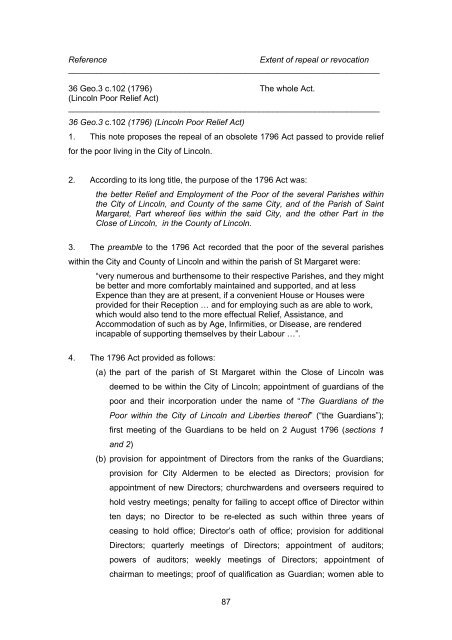Poor Relief - Law Commission
Poor Relief - Law Commission
Poor Relief - Law Commission
Create successful ePaper yourself
Turn your PDF publications into a flip-book with our unique Google optimized e-Paper software.
Reference Extent of repeal or revocation<br />
___________________________________________________________________<br />
36 Geo.3 c.102 (1796)<br />
(Lincoln <strong>Poor</strong> <strong>Relief</strong> Act)<br />
The whole Act.<br />
___________________________________________________________________<br />
36 Geo.3 c.102 (1796) (Lincoln <strong>Poor</strong> <strong>Relief</strong> Act)<br />
1. This note proposes the repeal of an obsolete 1796 Act passed to provide relief<br />
for the poor living in the City of Lincoln.<br />
2. According to its long title, the purpose of the 1796 Act was:<br />
the better <strong>Relief</strong> and Employment of the <strong>Poor</strong> of the several Parishes within<br />
the City of Lincoln, and County of the same City, and of the Parish of Saint<br />
Margaret, Part whereof lies within the said City, and the other Part in the<br />
Close of Lincoln, in the County of Lincoln.<br />
3. The preamble to the 1796 Act recorded that the poor of the several parishes<br />
within the City and County of Lincoln and within the parish of St Margaret were:<br />
“very numerous and burthensome to their respective Parishes, and they might<br />
be better and more comfortably maintained and supported, and at less<br />
Expence than they are at present, if a convenient House or Houses were<br />
provided for their Reception … and for employing such as are able to work,<br />
which would also tend to the more effectual <strong>Relief</strong>, Assistance, and<br />
Accommodation of such as by Age, Infirmities, or Disease, are rendered<br />
incapable of supporting themselves by their Labour …”.<br />
4. The 1796 Act provided as follows:<br />
(a) the part of the parish of St Margaret within the Close of Lincoln was<br />
deemed to be within the City of Lincoln; appointment of guardians of the<br />
poor and their incorporation under the name of “The Guardians of the<br />
<strong>Poor</strong> within the City of Lincoln and Liberties thereof” (“the Guardians”);<br />
first meeting of the Guardians to be held on 2 August 1796 (sections 1<br />
and 2)<br />
(b) provision for appointment of Directors from the ranks of the Guardians;<br />
provision for City Aldermen to be elected as Directors; provision for<br />
appointment of new Directors; churchwardens and overseers required to<br />
hold vestry meetings; penalty for failing to accept office of Director within<br />
ten days; no Director to be re-elected as such within three years of<br />
ceasing to hold office; Director’s oath of office; provision for additional<br />
Directors; quarterly meetings of Directors; appointment of auditors;<br />
powers of auditors; weekly meetings of Directors; appointment of<br />
chairman to meetings; proof of qualification as Guardian; women able to<br />
87
















